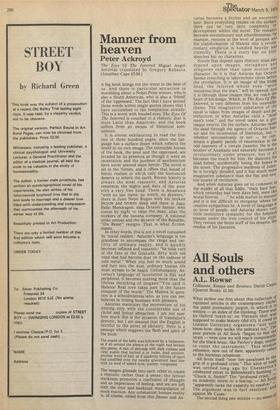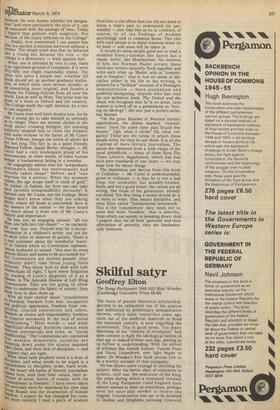All Souls and others
A.L. Rowse
Collisions, Essays and Reviews. David Call° (Quartet Books £1.50) What strikes one first about this collection of reprinted articles is the contemporary oliehe.: the jaded journalistic jargon, in which it I' written — an index of the thinking. There Was an Oxford 'teach-in' on Vietnam that was supposed to make history (did it?). It owed t° London University organisers "not onleY know-how: they broke the political ice." 11% poor porters at All Souls "began to feel tniv." strain — even now we still reach compulaar,Ye for the black brute, like Pavlov's dogs, unaut., to resist the instrument." This modis'', reference, now out of date, apparently refer' to the harmless telephone. All Souls itself "now lies paralysed int-, grip of a profound crisis." This kind of has,", was settled long ago by Chesterton," celebrated retort to Birkenhead's humbug "Chuck it, Smith!" The "profound crisis." is an academic storm in a teacup, — All So,al, "apparently lacks the capacity to resolve.' d The argument was in fact resolved, an
against Mr Caute. of The second thing one notices — no sense humour. He now doubts whether his resignation "and more particularly the style of it, can be sustained with the passage of time. Today I regard that gesture with suspicion. Not because of the injury inflicted on the College" • • . Really, how portentous! I can assure him that the ancient institution survived without a tremor. The simple truth was that he behaved like a young ass, because the vote — the college is a democracy — went against him.
When one is defeated by two to one, there iS no legitimate ground of complaint; if it were fifty-fifty one might reasonably repine. The issue was quite a simple one: whether All Souls should set up another graduate institution, of which there were several already; or do something more original, and finance a scheme for Visiting Fellows from all over the World, East as well as West. The latter was far More of a boon to Oxford and the country. The College made the right decision, by a two to one majority.
Mr Caute may well have doubts now, for he was a young ass to take himself so seriously as to resign. There are several cliches in the book about crossing bridges; the ensuing Publicity enabled him to cross the Atlantic With some reclame to the haven of Mr Conor Cruise O'Brien, though the union of spirits did llot last long. The fact is, as a quite friendly disposed Fellow, Isaiah Berlin, thought — Mr Caute had a very inadequate grasp of his environment, in other words, of other human beings: a fundamental failing in a novelist. lie engagingly admits that his "antipathetic sentiments about the environment had already taken shape" before, and "one searches for a pretext. When the moment comes, the ego wraps itself in cloth of gold." Ct, rather, in fustian, for how can one take !Lich juvenile irresponsibility seriously? It Barmed only Mr Caute, not the College. Most People don't know what they are talking a,bout, where All Souls is concerned: here is the essence of the matter — we have heard up° much about it from one of Mr Caute's stature and importance. He has, too, an engaging naiveté: "all too fteri one falls into the chasm" — he certainly yid over that one. Naiveté may be a recommendation in a children's writer, but not for an adult critic or observer of society. There is nail comment about the wonderful 'teachIb' at Oxford which no Communist representatives bothered to attend: "this was its most Perious failure and needs to be accounted for." ullt Communists are serious people: they evidently didn't take these young fools seriously. They know how to deal with Left intellectuals all right; I have never forgotten ttlY reading of Lenin's diagnosis of it as a tsease, in The Infantile Disease of Left-Wing tj)rnmunism. They are not going to allow i'en1 to undermine the fabric of society: they now how to shut them up.
, With all their chatter about "commitment Lb freedom: freedom from war, occupation :nd Political oppression, freedom from cenc°rship., crusted convention and taboo, 'reedom as choice and responsibility, freedom 4ns creative autonomy in the face of social `s-cinclitioning." Mere words — and what Perficial. thinking! Societies cannot exist Nyithout conventions and rules, or "social `:tL?rlditioning." The Communists are convinced bgat western democratic societies are Lireaking down under the strains imposed 11>C/11 them, and their lack of discipline — and s,.usPect they are right. What these false prophets need is a dose of clsciPline, and what needs to be urged is a P,tnntitment to discipline, order, hard work. ;II the hoary old hacks of literary journalism ;13Pear here, with their false values, their inqersion of sense. Sartre, of course, with his hei°111mitment to freedom." I have never taken sorn seriously since he expressed his view that fr Viet Russia was the incarnation of human beedom. I expect he has changed his tune; more recently I read a piece of wisdom
from him to the effect that one did not need to know a man's past to understand his personality — just take him as he is: contrary, of course, to all the findings of modern psychology and to common sense. The rule with such people is to stand common sense on its head — and asses will be taken in.
It would do these people good not to read a muddled Franco-German like Sartre but a classic writer, like Montherlant. No mention of him, but Norman Mailer occurs: these third-rate writers naturally flock together and write each other up. Mailer, who is "committed to freedom," that is, has no sense of discipline either in his life or his writing, is praised for a "brilliant" account of a Pentagon demonstration — mere journalism and publicity-mongering. Anyone who has read his one authentic book, The Naked and the Dead, will recognise that he-is no artist. Jane Austen is ticked off in a parenthesis as "having no ideology"; she was just a perfect artist, like Mozart.
"On the great Bourses of Western literary appreciation, the shares marked 'commitment' have for some time past found few buyers." Ugh, what a cliché! Oh, what vulgarity! These are the terms in which these people write, for they do not think. It is all the claptrap of mere literary journalism. The pieces are reprinted from a wide range of the usual periodicals — many of them from The Times Literary Supplement, which has had such poor standards of late years — we may hope now for better things.
The impression one derives from this book of Collisions — Mr Caute is understandably given to collisions — is that he is not a bad chap, nor unlikable; but muddle-headed, facile, and not a good writer. His values are all wrong, like those of his generation, already out-dated. The first thing a writer should do is to learn to write. That means discipline, and what Eliot called "fundamental brainwork." This is the 'commitment' they need, not to more and more 'freedom', that is anarchy, from which our society is breaking down. And I suspect that, for all their 'gestures' and their affectation of sincerity, they are fundamentally insincere.



































 Previous page
Previous page